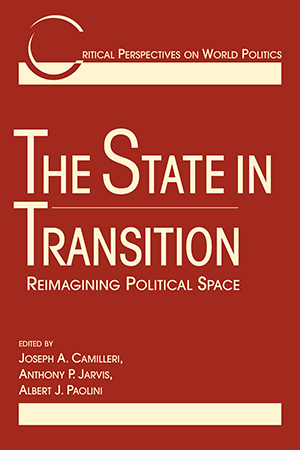Joseph A. Camilleri, Anthony P. Jarvis, and Albert J. Paolini, editors
Until recently, the bounded, territorial, and sovereign state has been the foundation of modern understandings of political space. Now, however, as the patterns of world politics undergo major transformations through the competing processes of global integration and fragmentation, we are faced with the problem of how to conceptualize new and complex relationships. Further, addressing this problem requires a rethinking of the very categories we use in understanding local, national, and international politics and a reimagining of the nature of political space itself.
This book explores these issues conceptually and through case studies. The authors deal with the problem of identity and political space, analyze in detail the impact on the state of a globalized political space, and conclude with an effort to locate the state in these various developments and to characterize its trajectory as it struggles to adapt and survive.
Joseph A. Camilleri is professor and head of the School of Politics at La Trobe University (Australia). A frequent contributor to scholarly and popular journals, he has published several influential books on global strategic, economic, and political issues, most recently The State and Nuclear Power and The End of Sovereignty? The Politics of a Shrinking, Fragmenting World. He also chairs the Editorial Committee of the journal Pacifica: Peace, Security and Global Change. Anthony P. Jarvis is assistant lecturer in the School of Politics at La Trobe University. He is a member of the Editorial Board of Pacifica and of the Advisory Board of Millenium: Journal of International Studies. Albert J. Paolini is assistant lecturer in the School of Politics at La Trobe University. He is review editor of Pacifica and a member of the Editorial Board of the Melbourne Journal of Politics.
"A substantial contribution to the field of international relations.... This work is both insightful and provocative."—Susan Stoudinger Northcutt, International Social Science Review
"Whatever my reservations about the post-modernist affectations of some contributors, The State in Transition remains a scholarly, informative and sometimes challenging work."—Australian Journal of Political Science
"[Does] a good job of de-fetishising the State, without marginalising its importance."—Millennium






